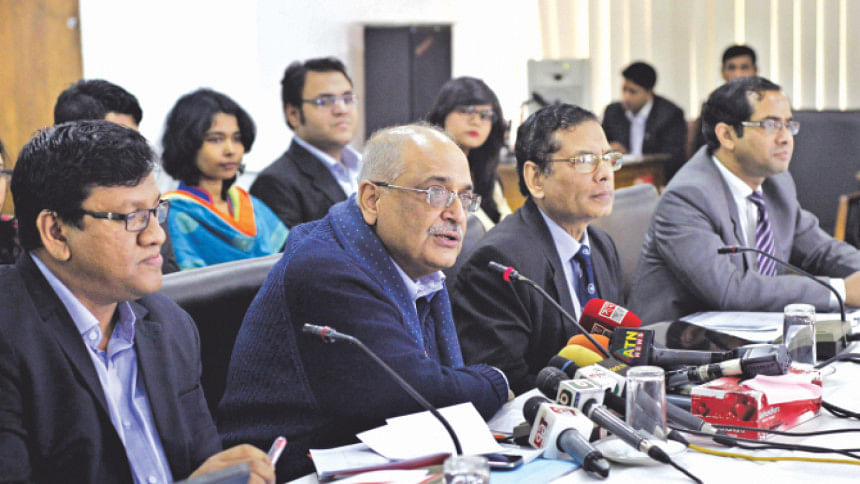CPD denounces govt stance on banking sector

The Centre for Policy Dialogue yesterday came down hard on the government for recapitalising the state banks despite their financial malpractices, and rescheduling the bad loans of Beximco Group.
The government has been incurring heavy revenue losses over the last week as the country's export-import through the major land ports is badly disrupted thanks to the BNP-led combine's indefinite blockade since January 6. Several hundred goods-laden Indian trucks are stuck at Benapole, Sonamasjid and Hili Land Ports as required number of Bangladeshi trucks could not get there for unloading the goods due to the blockade that has left several trucks either torched or vandalised over the past few days
The government has been incurring heavy revenue losses over the last week as the country's export-import through the major land ports is badly disrupted thanks to the BNP-led combine's indefinite blockade since January 6. Several hundred goods-laden Indian trucks are stuck at Benapole, Sonamasjid and Hili Land Ports as required number of Bangladeshi trucks could not get there for unloading the goods due to the blockade that has left several trucks either torched or vandalised over the past few days

The think-tank went on to term the recapitalisation, which is being done with taxpayers' money, as 'nationalisation of losses' and the rescheduling 'denationalisation of profits'.
This is not a good sign for the economy and the banking sector, Mustafizur Rahman, executive director of CPD, said at the unveiling of a report on the economic performance so far this fiscal year.

The government last week provided Tk 1,500 crore to the two most scam-hit state banks -- Sonali and BASIC -- to meet their large-scale capital shortfall as a result of mounting bad loans. BASIC Bank received Tk 790 crore and Sonali Tk 710 crore.
The amount came from the Tk 5,000 crore earmarked by the government in this year's budget for recapitalisation of state banks.
This is the second year that the government has provided funds to the state-banks for their incompetency. Last fiscal year, the government gave the four state-owned commercial banks a total of Tk 4,100 crore for recapitalisation.
"With generous support from the government, the state-owned banks were able to adjust their accounts to make up for their losses created through various financial malpractices," CPD said in the report.
While the government is injecting capital into these troubled banks in order to keep them afloat, allocation for other priority areas including social sectors remain less than adequate, it said.
Thus, recapitalisation of the banks raises questions about prioritisation of public resources, particularly when they continue to be fraught with governance challenges.
"The fact that such capital infusion has not seen any improvement in the recipient banks is rather frustrating."
Ironically, in most cases, these incidences have occurred in collaboration with officials and directors of banks through various types of dubious practices such as by setting up fake companies, forging bank documents, documenting fake board meetings and influencing the monitoring officials.
In the state-owned banks, the senior management is appointed by the government and as a result, are not held accountable for the irregularities, the report said.
In case of scams at Sonali and BASIC, the concerned chairpersons and the directors of the board were not questioned by the authorities.
About the rescheduling of Beximco Group's loans amounting Tk 5,269 crore, CPD said: "This is an unprecedented measure."
Beximco sought to reschedule its loans from seven banks for repayment to 2026.
In November last year, Sonali rescheduled loans of the group amounting Tk 982.44 crore at 10 percent interest rate for 12 years till 2026, which is now awaiting approval from the Bangladesh Bank.
Inspired by Sonali, Janata has also decided to reschedule Tk 1,849 crore given as loan to five garment and textile units of Beximco Group for 11 years, till 2025 at 11 percent interest rate.

Rupali has followed suit too.
The other four banks -- Agrani, National, Exim and AB -- are likely to offer similar facility to the group, the report said.
"None has ever been given such a long time for repayment in the history of Bangladesh," CPD said, citing the interest rate charged on the loans, which is far below the market rate of 13-14 percent.
"This is also a violation of rescheduling norms set by Bangladesh Bank, which says that no default loan can be rescheduled more than three times. However, Sonali Bank has so far rescheduled Beximco's loans seven times."
Citing Beximco's rescheduling example, CPD went on to mention of special benefits extended to a select few in the private sector.
"This is yet another example of a biased lending decision-making. Ironically, such political favours to the chosen sections of the society further encourage lenders to engage in malpractices, which, in turn, weaken the banking sector."
The think tank also said the concentration of outstanding loans in the hands of a few business groups indicates the high level of risk and vulnerability in the sector.
With a view to establishing discipline in the sector, the central bank has to work independently without external pressure, it said.
The think tank also criticised the private banks.
"Private commercial banks are not unscathed either. Fraudulent activities are also observed in these banks where owners and the management have been party to," it said in the report.
Officials cannot go against the wishes of the management for fear of losing their jobs. But on the other hand, some are rewarded through high salaries for facilitating malpractices of the owners of private banks.
By and large, the banking sector suffers from supervision and oversight weaknesses, Rahman said.
"It is in a very vulnerable situation -- and it is time to address these issues. But instead of doing that, we see a lot of opportunities being offered to state banks to make up their losses created through various financial malpractices," he said.
The think tank went on to call for an independent commission for the financial sector to identify the inherent problems and the emerging challenges and make recommendations for an efficient banking system.

 For all latest news, follow The Daily Star's Google News channel.
For all latest news, follow The Daily Star's Google News channel. 



Comments